Key takeaways
- The Portland writers community fosters genuine connections and supports diverse voices, creating a nurturing environment for writers.
- The Pacific Northwest Writers Association offers professional development alongside a sense of camaraderie, welcoming writers at all stages.
- Participating in local writers groups enhances accountability, motivation, and the opportunity for constructive feedback, making writing a shared endeavor.
- Engaging authentically and consistently deepens relationships within the community, turning casual interactions into meaningful collaborations.
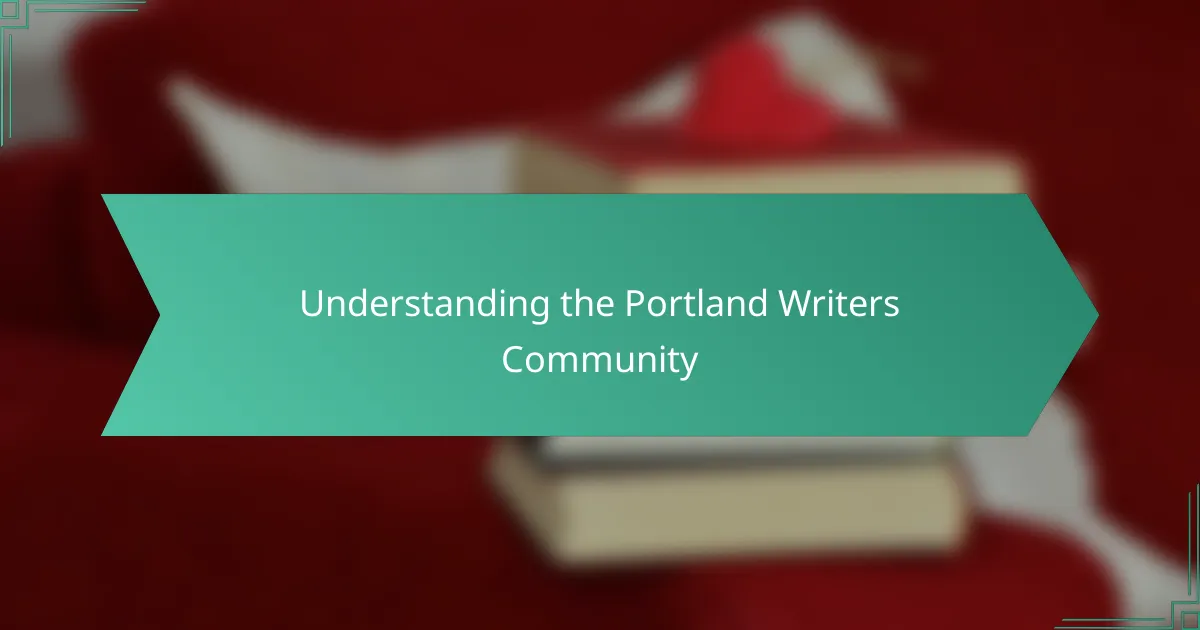
Understanding the Portland Writers Community
Portland’s writers community feels like a living, breathing organism—vibrant, welcoming, and full of diverse voices. I’ve always found it fascinating how this community thrives on genuine connection rather than competition. Have you ever noticed how sharing a single story can spark friendships that last far beyond any writing event?
What strikes me most is the openness here. I remember showing up nervously to a local workshop, unsure if my work would be accepted. Instead, I was met with encouragement and thoughtful feedback, which made me realize that Portland writers truly want each other to succeed.
Isn’t it refreshing to be part of a circle where creativity is celebrated in all its forms? That’s exactly what the Portland writers community offers—a safe space where everyone’s unique perspective contributes to a richer, collective narrative. It’s more than just a network; it feels like a home for storytellers.
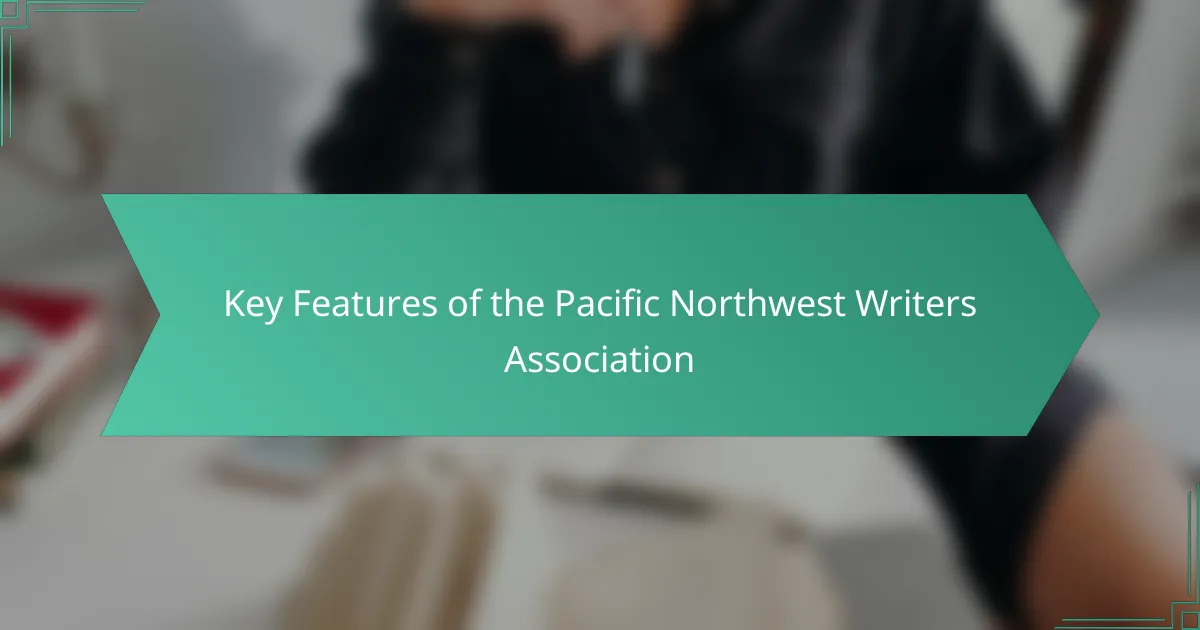
Key Features of the Pacific Northwest Writers Association
One thing I’ve noticed about the Pacific Northwest Writers Association is how it balances professionalism with a warm sense of camaraderie. Their workshops and conferences are expertly organized, yet they never lose that personal touch where every writer feels seen and valued. Have you ever attended an event where you left feeling both inspired and genuinely connected? That’s a hallmark of PNW Writers.
Another feature I really appreciate is their commitment to nurturing writers at every stage—from beginners to seasoned authors. I once joined a critique group through their network and was amazed at how honest yet supportive the feedback was. It’s not just about improving your craft; it’s about growing with others who truly understand the pains and joys of writing.
What sets PNW Writers apart, for me, is the diversity of opportunities they offer—whether it’s monthly meetings, writing contests, or online resources. These options allow members to engage in ways that fit their own creative rhythms. Doesn’t that kind of flexibility make writing feel less like a solitary struggle and more like a shared adventure?
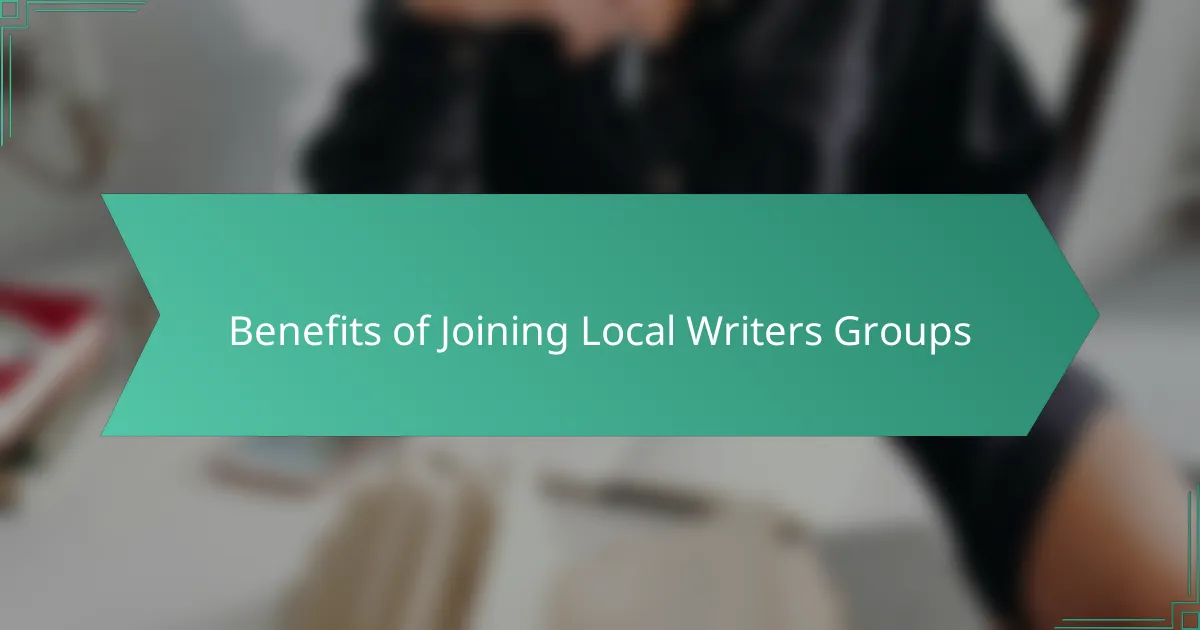
Benefits of Joining Local Writers Groups
Joining a local writers group has been a game-changer for me because it creates a space where feedback feels like a genuine conversation rather than a critique session. Have you ever felt stuck on a piece and wished someone could offer just the right insight? That’s exactly what these groups provide—a sounding board that pushes your work to new heights while keeping your voice intact.
Beyond the craft, there’s something deeply motivating about being surrounded by others who share your passion. I often find myself inspired simply by hearing about fellow writers’ projects and struggles. It reminds me that writing isn’t an isolated journey but a shared experience filled with ups and downs that everyone navigates together.
What I value most is the sense of accountability that comes with regular meetings and commitments. When you’re part of a group, writing becomes more than a hobby—it becomes a goal you actively work toward. This structure has helped me develop discipline and celebrate small victories, which makes the creative process feel not only productive but also rewarding.
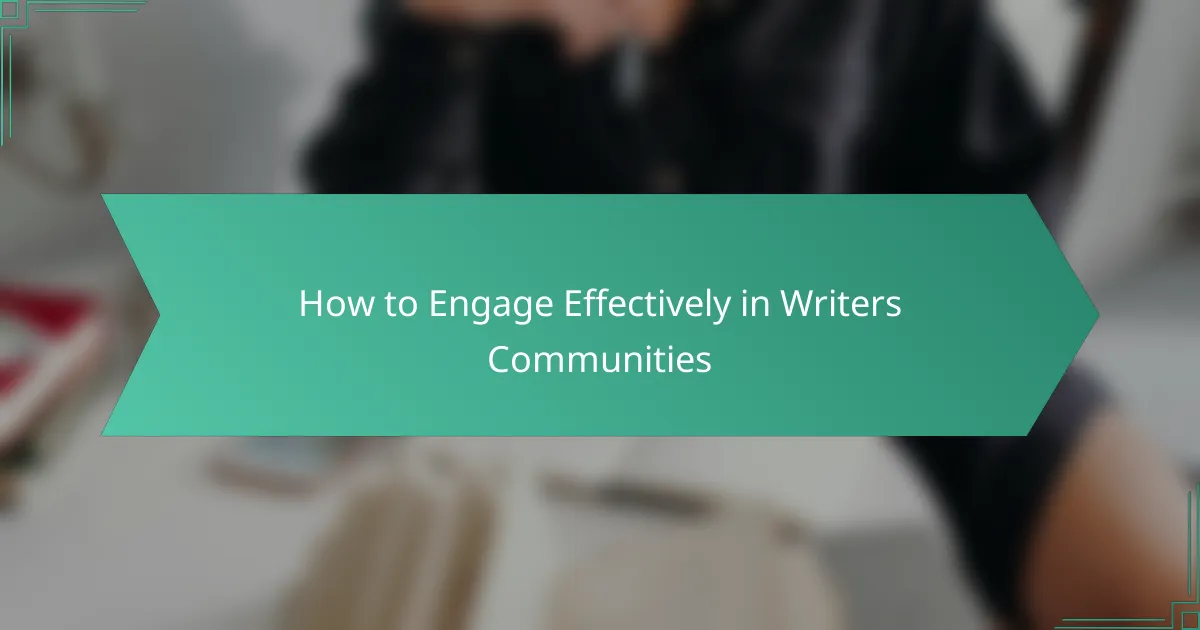
How to Engage Effectively in Writers Communities
Engaging effectively in writers communities starts with showing up authentically. I’ve found that being open about where I am in my writing journey builds trust and invites meaningful connections. Have you ever noticed how honest conversations about struggles or successes create bonds stronger than just exchanging business cards?
Listening plays a crucial role too—sometimes, the best way to engage is by truly hearing others’ stories and feedback. When I focus on understanding rather than just responding, the exchange feels richer and more rewarding. It turns conversations into collaborations that fuel creativity rather than competition.
Consistency matters as well. Attending meetings or workshops regularly isn’t always easy, but it’s what transforms casual acquaintances into a support network. I’ve learned that showing up week after week not only sharpens my writing but also deepens my sense of belonging within the community. Have you experienced how routine involvement can change your creative life?
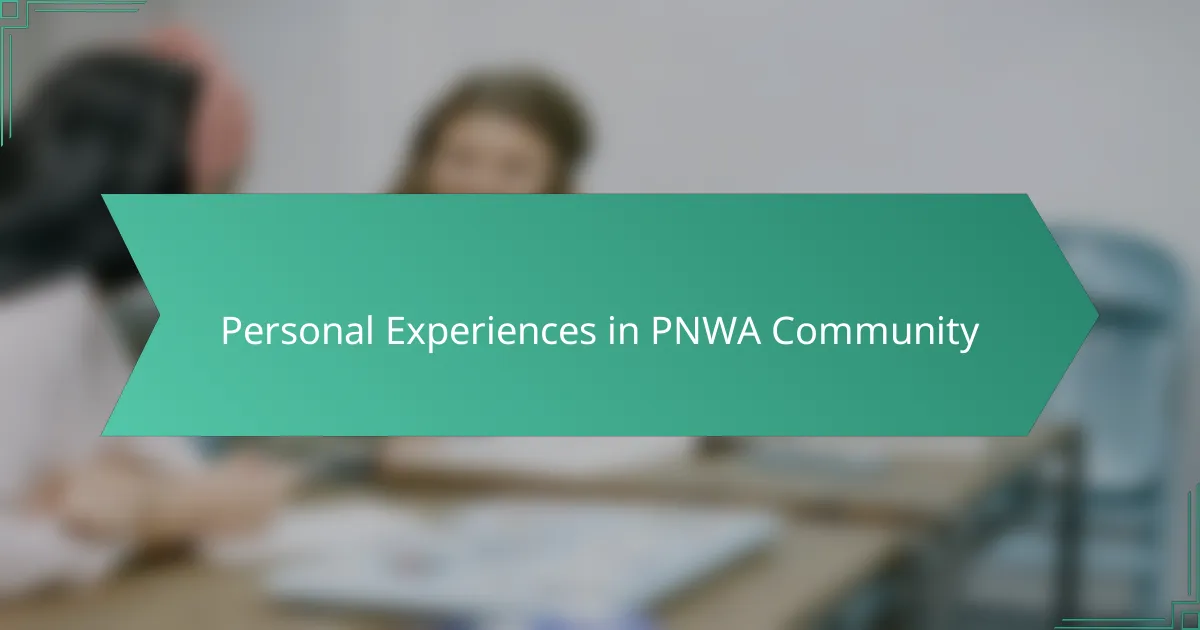
Personal Experiences in PNWA Community
The first time I attended a PNWA conference, I was a bundle of nerves, carrying pages filled with half-formed ideas. But by the end of the weekend, those nerves had translated into connections—people who didn’t just critique my writing but genuinely wanted to see me flourish. Have you ever felt that rare blend of critique and care in a single room? That’s exactly what PNWA delivers.
What stands out to me even now are the small moments in their critique groups, where vulnerability becomes strength. Sharing a rough draft and hearing honest, thoughtful feedback wasn’t always easy, but it made me realize how much growth comes from trusting others with your words. Have you experienced that mix of humility and pride when your story improves because you dared to listen?
Most meaningful, though, is the ongoing camaraderie I’ve found with fellow members. Even after the formal events end, the conversations continue—whether it’s cheering each other on through a tough rewrite or celebrating a publishing milestone. Doesn’t having that kind of support change the writing process from a solitary challenge to a shared journey? It sure did for me.
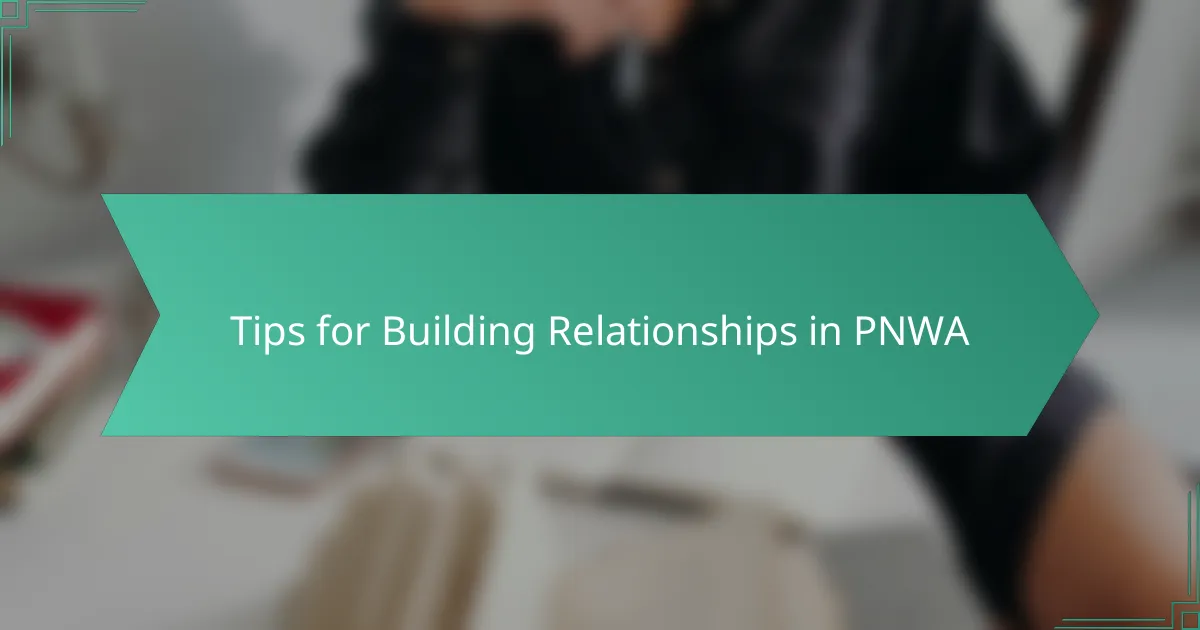
Tips for Building Relationships in PNWA
One tip I’ve found invaluable in building relationships within PNWA is to volunteer for events or committees. Getting involved behind the scenes not only helps the organization but also naturally opens doors to deeper connections. Have you ever noticed how working alongside others toward a common goal creates a bond that goes beyond casual introductions? That shared effort often sparks the strongest, most lasting friendships.
I also recommend leveraging the critique groups PNWA offers. It can be intimidating at first to share your work openly, but those honest and supportive exchanges have been game changers for me. There’s something powerful about exposing your vulnerabilities and being met with constructive encouragement—don’t you think trust grows fastest when you’re willing to be real with others?
Lastly, don’t underestimate the value of informal conversations between events. I once struck up a chat with a fellow member during a coffee break and ended up collaborating on a writing project months later. Sometimes the magic happens in those small, unplanned moments. How often do we overlook the potential of simple, genuine interactions? In PNWA, those moments truly matter.
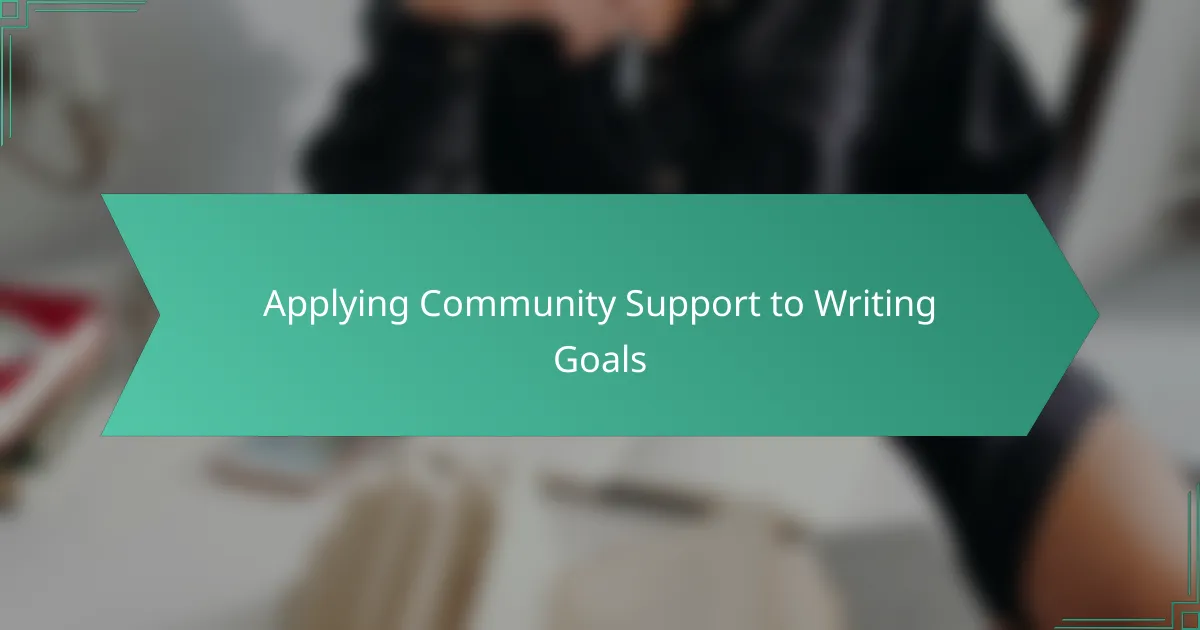
Applying Community Support to Writing Goals
Applying community support to writing goals has been a revelation for me. When I set a target—say, finishing a draft or submitting to a contest—knowing there’s a group rooting for me adds accountability in a way that simply writing alone never did. Have you ever noticed how just sharing your goals with others makes them feel more real and attainable?
I’ve also realized how feedback from fellow PNWA members sharpens my focus. Sometimes, I think I’m stuck or off track until someone points out a fresh perspective that shifts my entire approach. That kind of insight doesn’t just improve the writing; it transforms how I approach the work itself.
And there’s the emotional lift that comes with community support. Writing can be isolating, but when you connect regularly with people who understand the ups and downs, motivation and confidence grow naturally. It’s like having a creative safety net that keeps me moving forward no matter how tough the process gets. Have you experienced that boost when your community believes in your story as much as you do?